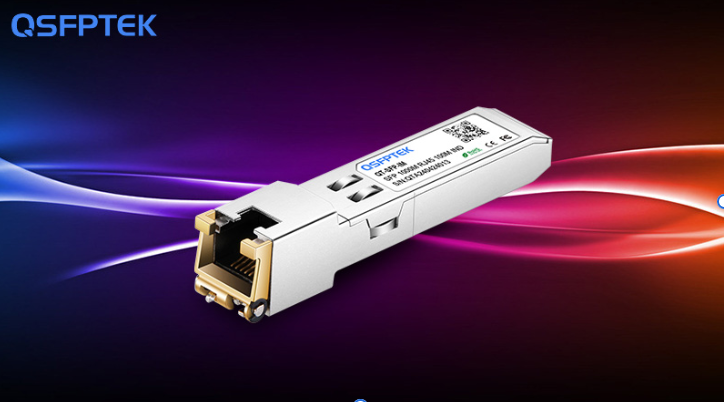In the industrial world, uninterrupted connectivity is no longer just an advantage—it is a necessity. Every minute of downtime can translate into lost productivity, delayed operations, safety hazards, and significant financial losses. In industries such as manufacturing, energy, transportation, and mining, the cost of network disruptions can reach thousands or even millions of dollars. To ensure continuous operations, companies increasingly rely on robust networking components that can withstand harsh conditions. Among these, industrial copper 1000BASE-T SFP modules play a vital role in delivering reliable gigabit connectivity while minimizing downtime.
What is an Industrial Copper 1000BASE-T SFP Module?
A copper 1000BASE-T SFP module is a SFP transceiver that enables Gigabit Ethernet connectivity over standard copper cabling such as Cat5e, Cat6, or Cat6a. Unlike optical SFPs that use fiber, copper modules feature an RJ45 connector, which makes them simple and cost-effective for short-distance data transmission up to 100 meters. The industrial-grade version is specifically designed for harsh environments where ordinary modules would quickly fail. These modules can tolerate a wide temperature range, often from -40°C to 85°C, and are resistant to electromagnetic interference caused by heavy machinery or electrical equipment. They are housed in rugged enclosures, equipped with long-life components, and built to operate consistently even when exposed to vibration, dust, or humidity. This makes them fundamentally different from their commercial counterparts and well-suited for mission-critical deployments.
The Benefits of Industrial-Grade Copper SFP Modules
The most obvious advantage of industrial-grade copper SFP modules is their ability to operate reliably in environments that challenge traditional equipment. In a factory, a commercial-grade module might overheat or fail when exposed to constant vibration and fluctuating temperatures, while its industrial counterpart is designed to maintain stable connections without interruption. This reliability translates directly into fewer unexpected failures and less downtime.
Another major benefit lies in cost efficiency. Although fiber optics dominate when it comes to long-distance or high-bandwidth requirements, they are often unnecessary for short-range industrial connections. Copper SFPs take advantage of existing Ethernet cabling infrastructure, delivering gigabit speeds without the cost of new fiber installations. For many businesses, this balance between performance and affordability makes copper modules an attractive choice.
Flexibility is also a defining feature. Because these modules are hot-swappable, they can be replaced or upgraded without taking down the network. Their broad compatibility with industrial Ethernet switches and routers ensures seamless integration, and their extended product life reduces the frequency of replacements. For operators, this means lower maintenance costs and fewer service interruptions.
Applications in Industrial Environments
Industrial copper 1000BASE-T SFP modules are widely deployed in areas where resilience is critical. In factory automation, real-time monitoring and control systems depend on uninterrupted connectivity to keep production lines moving. Smart grids and energy systems, including power plants and renewable energy farms, rely on durable networking hardware to maintain stability and efficiency over long periods of continuous operation. Transportation networks such as rail systems or intelligent traffic control face challenges of vibration, dust, and temperature extremes that demand ruggedized modules. In oil, gas, and mining sectors, outdoor deployments expose equipment to harsh climates where only industrial-grade hardware can ensure uninterrupted communication. In all these scenarios, downtime is not a mere inconvenience but a direct threat to productivity and safety, and industrial copper SFP modules provide the reliability needed to keep operations running.
How They Help Reduce Downtime
The central value of these modules is their ability to reduce downtime. Because they are built with enhanced durability, the risk of sudden failure is dramatically reduced, and the network remains available even under stress. Their extended product lifecycle means fewer replacements are required, which reduces both maintenance work and the chances of interruption during changeovers. Their ability to deliver consistent performance under conditions such as freezing cold, high heat, or electromagnetic interference ensures that critical applications like industrial automation, predictive maintenance, and IIoT continue running smoothly. In this way, industrial copper SFPs not only protect against immediate disruptions but also safeguard long-term productivity by supporting stable, reliable communication networks.
Choosing the Right Industrial Module
Selecting the right industrial copper SFP module requires careful consideration. The operating temperature range must match the environmental conditions of the deployment site, and compatibility with existing switches and routers must be confirmed. The choice of cabling—Cat5e, Cat6, or Cat6a—also affects performance, so ensuring alignment between the module and infrastructure is essential. Beyond technical specifications, the reliability of the supplier plays an important role. A reputable vendor that offers proven quality, warranty support, and responsive service can make a significant difference in minimizing risks and maximizing uptime.
Conclusion
In industrial environments, downtime is costly and disruptive. A single module failure can halt production, compromise safety, and lead to substantial financial losses. Industrial copper 1000BASE-T SFP modules address this challenge by combining rugged design, wide temperature tolerance, and resilience against environmental stressors. By reducing downtime, lowering maintenance costs, and extending equipment lifespans, they provide long-term value that far exceeds their initial investment. For industries where reliability is non-negotiable, adopting industrial-grade copper SFP modules is more than a smart choice—it is a critical step toward ensuring seamless operations and sustained productivity.



